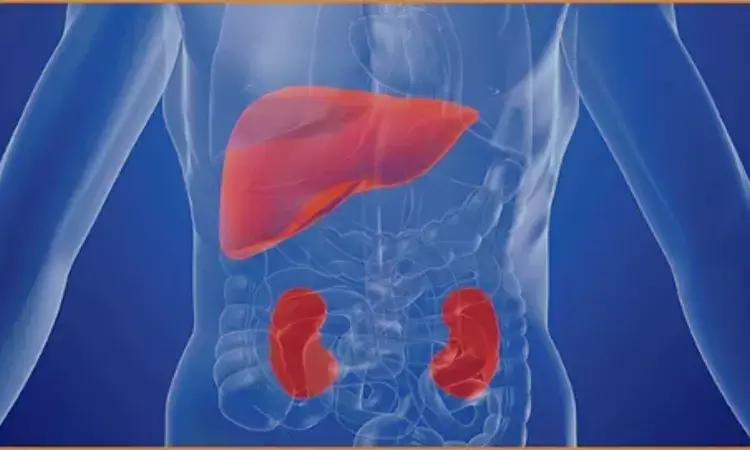- Home
- Medical news & Guidelines
- Anesthesiology
- Cardiology and CTVS
- Critical Care
- Dentistry
- Dermatology
- Diabetes and Endocrinology
- ENT
- Gastroenterology
- Medicine
- Nephrology
- Neurology
- Obstretics-Gynaecology
- Oncology
- Ophthalmology
- Orthopaedics
- Pediatrics-Neonatology
- Psychiatry
- Pulmonology
- Radiology
- Surgery
- Urology
- Laboratory Medicine
- Diet
- Nursing
- Paramedical
- Physiotherapy
- Health news
- Fact Check
- Bone Health Fact Check
- Brain Health Fact Check
- Cancer Related Fact Check
- Child Care Fact Check
- Dental and oral health fact check
- Diabetes and metabolic health fact check
- Diet and Nutrition Fact Check
- Eye and ENT Care Fact Check
- Fitness fact check
- Gut health fact check
- Heart health fact check
- Kidney health fact check
- Medical education fact check
- Men's health fact check
- Respiratory fact check
- Skin and hair care fact check
- Vaccine and Immunization fact check
- Women's health fact check
- AYUSH
- State News
- Andaman and Nicobar Islands
- Andhra Pradesh
- Arunachal Pradesh
- Assam
- Bihar
- Chandigarh
- Chattisgarh
- Dadra and Nagar Haveli
- Daman and Diu
- Delhi
- Goa
- Gujarat
- Haryana
- Himachal Pradesh
- Jammu & Kashmir
- Jharkhand
- Karnataka
- Kerala
- Ladakh
- Lakshadweep
- Madhya Pradesh
- Maharashtra
- Manipur
- Meghalaya
- Mizoram
- Nagaland
- Odisha
- Puducherry
- Punjab
- Rajasthan
- Sikkim
- Tamil Nadu
- Telangana
- Tripura
- Uttar Pradesh
- Uttrakhand
- West Bengal
- Medical Education
- Industry
Inflammatory Markers Linked to MAFLD Risk in Hypertensive Patients: Study Highlights AISI as a Key Predictor

China: A large-scale cross-sectional study conducted in China has examined the relationship between inflammatory indices and the prevalence of metabolic dysfunction-associated fatty liver disease (MAFLD) in hypertensive patients.
The findings, published in the Journal of Inflammation Research, highlight the significant association between elevated inflammatory markers and the likelihood of developing MAFLD, suggesting that these markers could serve as valuable tools for risk stratification in clinical practice.
The researchers note that inflammation plays a crucial role in the development and progression of hypertension by activating the immune system and damaging the vascular endothelium. Similarly, MAFLD, which is closely linked to chronic low-grade inflammation, contributes to disease progression through metabolic imbalances and dysfunction of adipose tissue. Hypertension, a leading cause of cardiovascular diseases, is closely associated with various metabolic disorders, including MAFLD, a condition known for its significant impact on liver-related morbidity.
Against the above background, Di Shen, Graduate School, Xinjiang Medical University, Urumqi, Xinjiang, People’s Republic of China, and colleagues explore the link between inflammatory indices and MAFLD in hypertensive patients while evaluating the predictive accuracy of these indices for the condition.
For this purpose, the researchers conducted a cross-sectional analysis of 34,303 hypertensive patients from a Chinese hospital registry. MAFLD was diagnosed using metabolic dysfunction criteria, and evidence of hepatic steatosis was confirmed through imaging. Inflammatory indices, including the monocyte-to-lymphocyte ratio (MLR), neutrophil-to-lymphocyte ratio (NLR), platelet-to-lymphocyte ratio (PLR), systemic inflammatory response index (SIRI), systemic immune-inflammation index (SII), and aggregate index of systemic inflammation (AISI), were calculated using complete blood counts.
The relationship between these indices and MAFLD was assessed using multivariable logistic regression, adjusting for potential confounders. The indices' diagnostic performance was evaluated using receiver operating characteristic (ROC) curves and area under the curve (AUC) calculations.
The study revealed the following findings:
- Patients with MAFLD had significantly higher levels of all inflammatory indices than those without MAFLD.
- After adjusting for confounders, each standard deviation increase in AISI, SIRI, and SII was associated with a 74%, 62%, and 58% increased odds of developing MAFLD, respectively.
- The AUC for AISI was 0.659, indicating moderate diagnostic accuracy.
- The AUCs for SIRI and SII were 0.626 and 0.619, respectively.
- NLR, PLR, and MLR showed lower AUCs of 0.593, 0.558, and 0.589, respectively.
The large cross-sectional study highlights a significant link between elevated inflammatory indices and MAFLD in hypertensive patients, with AISI demonstrating the strongest predictive value.
"These findings emphasize the potential of using non-invasive inflammatory biomarkers for MAFLD risk stratification, suggesting the need for further prospective research to explore their clinical applicability," the researchers concluded.
Reference:
Shen, D., Cai, X., Hu, J., Song, S., Zhu, Q., Ma, H., … Li, N. (2025). Inflammatory Indices and MAFLD Prevalence in Hypertensive Patients: A Large-Scale Cross-Sectional Analysis from China. Journal of Inflammation Research, 18, 1623–1638. https://doi.org/10.2147/JIR.S503648
Dr Kamal Kant Kohli-MBBS, DTCD- a chest specialist with more than 30 years of practice and a flair for writing clinical articles, Dr Kamal Kant Kohli joined Medical Dialogues as a Chief Editor of Medical News. Besides writing articles, as an editor, he proofreads and verifies all the medical content published on Medical Dialogues including those coming from journals, studies,medical conferences,guidelines etc. Email: drkohli@medicaldialogues.in. Contact no. 011-43720751


